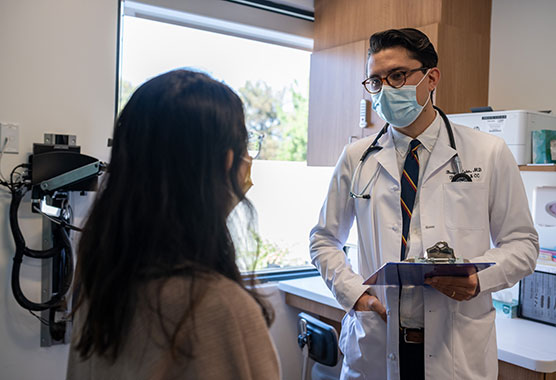Long COVID-19
UC Davis Health offers comprehensive, compassionate care for long COVID-19 and the wide range of symptoms you may experience.
Medically reviewed by Christian Sandrock, M.D. on Jan. 05, 2023.

What Is Long COVID-19 (Coronavirus)?
Long COVID involves the long-term effects of having COVID-19. It occurs when you still have coronavirus symptoms or develop new symptoms three months after your initial infection. These symptoms last for at least two months with no other explanation, according to the World Health Organization's definition of long COVID.
Long COVID-19 (also known as post-COVID or long-haul COVID) causes a wide range of symptoms that impact your physical and mental health. It can affect any part of your body, including your heart, lungs, skin, kidneys or brain.
Long COVID-19 Symptoms
Each person's experience of long COVID is unique. You may develop ongoing COVID-19 symptoms after only a mild infection or without ever testing positive for the coronavirus.
Most people with long COVID — called "long haulers" — recover within 12 to 18 weeks. Others experience symptoms for many months or years after an initial infection. Your symptoms may get worse over time or come and go.
With long COVID, you may develop chronic illnesses or other health conditions, such as type 2 diabetes, heart disease, stroke or myalgic encephalomyelitis/chronic fatigue syndrome (ME/CFS). In some cases, long COVID causes life-threatening symptoms or permanent disability.
Common Symptoms
Symptoms most often include fatigue, shortness of breath, chest pain and loss of smell (anosmia) or taste (dysgeusia). Long COVID may also cause:
- Blood clots
- Gastrointestinal problems, such as diarrhea, loss of appetite or stomach pain
- Fatigue that interferes with daily activities
- Fever or chills
- Heart abnormalities, such as chest pain or a fast or pounding heartbeat (palpitations)
- Joint or muscle pain
- Menstrual cycle changes
- Mental health issues, including anxiety, depression or obsessive-compulsive disorder (OCD)
- Neurological symptoms, such as difficulty thinking or concentrating ("brain fog"), headache or dizziness upon standing
- Rash
- Respiratory problems, including shortness of breath or chronic cough
- Sleep issues, such as insomnia
Emergency Symptoms of Long COVID-19
Seek immediate help if you have any of the following symptoms:
- Skin, lips or nails turning blue (cyanosis)
- Chest pain or pressure
- Confusion
- Difficulty breathing
- High fever (over 103 degrees F or 40 degrees C)
- Persistent dizziness
- Ringing in ears (tinnitus), earache, hearing loss
- Seizure
- Severe muscle pain or weakness
- Skin that turns blue or gray
Causes of Long COVID-19
A strain of coronavirus called severe acute respiratory syndrome (SARS-CoV-2) virus causes COVID-19. The exact cause of long COVID is unknown.
Research is ongoing, but most experts believe long COVID is not a single disease. Your infection may trigger:
- Autoimmune disorders that cause your immune system to attack parts of your body
- Blood clots (microclots) that prevent your organs from working properly
- Inflammation if your immune system overreacts and damages organs, bones and tissues
- Viral persistence if SARSCoV2 remains in your body and sparks an overactive immune response
- Viral reactivation if COVID-19 activates other viruses that have been inactive (dormant) in your body
- Long-term psychological impacts from hospitalization for severe symptoms or other mental health struggles
Risk Factors for Long COVID
Certain things increase your risk for long COVID, including:
Age
Long COVID occurs more often in adults than children or adolescents. Diagnosis is usually in people between the ages of 36 and 50.
Lack of vaccination against COVID-19
You are more likely to develop long-term COVID-19 if you are not vaccinated against the virus.
More than one COVID-19 infection
Your risk increases every time you are infected or reinfected by SARS-CoV-2.
Race
People who are Hispanic or Latino are more likely to develop long COVID.
Severe COVID
Long COVID-19 occurs more often in those who had severe COVID, especially after intensive care or hospitalization. Risk also increases for people who experience multisystem inflammatory disorder (MIS-C) during or after infection.
Biological Sex
Long COVID-19 occurs more often in women than men. It may also occur more in underserved communities, where health inequities prevent timely access to care.
Underlying health conditions
Your risk increases if you have a weakened immune system before getting COVID. You may also be more likely to develop long-term symptoms if you have conditions such as obesity, diabetes, lung disease or high blood pressure (hypertension).
Long COVID-19 Diagnosis and Testing
Your provider typically diagnoses long COVID at least three months after your initial infection and after you've had unexplained symptoms for at least two months.
Post-COVID cannot be diagnosed with a single test. Your provider does a physical exam and asks about your health history and symptoms. To confirm diagnosis and rule out conditions, you may receive:
- Blood test
- Chest X-ray to examine your heart, lungs, blood vessels, and bones
- A CT scan produces more detailed images of your body
- Echocardiogram (echo) or electrocardiogram (EKG) to see how well your heart works
- Lung (pulmonary) tests to check how well your lungs work
Treatments for Long COVID-19
No single treatment exists for long COVID. The therapies your specialist may recommend depend on your symptoms, their severity, your overall health and other factors.
You may require treatments from a range of specialists. Your care team may include pulmonology specialists, neurologists, gastroenterologists, cardiologists and others.
Our multidisciplinary team approach at UC Davis Health means we get to know you and your individual health needs in depth. We may recommend:
Medications
Providers can treat certain long COVID symptoms and conditions with over-the-counter or prescription drugs.
Physical Therapy
Exercise, massage and other treatments can ease your pain, reduce fatigue and improve your mobility.
Cardiac Rehabilitation
Cardiac rehab helps build your heart's strength and stamina.
Cognitive Care
Memory exercises and aids can help restore sharpness to your brain. You may be referred to a neurologist for support.
Respiratory Therapy
Pulmonary rehabilitation helps improve your ability to breathe while helping you build strength and endurance.
Mental Health Support
Counselors and support groups can help you manage the psychological effects of severe or long-term illness or hospitalization.
Preventing Long Covid-19
The best way to prevent long COVID-19 is to protect yourself against COVID-19 infection and its complications. To reduce your risk, you can:
- Avoid crowded indoor spaces
- Practice physical distancing
- Stay up to date on your COVID-19 vaccines
- Seek immediate treatment if you test positive for COVID-19 or experience symptoms
- Wash your hands regularly
- Wear a multilayered, snug-fitting mask (N95 or KN95)
Taking antiviral drugs such as Paxlovid, Molnupiravir and Remdesivir within five days of a positive COVID test may also reduce your risk of long COVID. UC Davis Health offers the full range of treatment options approved for children and adults so you can return to good health as soon as possible.
“Long COVID: major findings, mechanisms and recommendations,” Nature, https://www.nature.com/articles/s41579-022-00846-2#change-history
“Long Covid, Household Pulse Survey,” Centers for Disease Control and Prevention (CDC), https://www.cdc.gov/nchs/covid19/pulse/long-covid.htm
“Nearly One in Five American Adults Who Have Had COVID-19 Still Have ‘Long COVID," CDC, https://www.cdc.gov/nchs/pressroom/nchs_press_releases/2022/20220622.htm
Who does it affect?
15.4%Of adults in the U.S. have experienced long COVID
Source: CDC: Long COVID: Household Pulse Survey
Request an Appointment
As Sacramento's No. 1 hospital, you'll benefit from unique advantages in primary care and specialty care. This includes prevention, diagnosis and treatment options from experts in 150 specialties.
Referring Physicians
To refer a patient, submit an electronic referral form or call.
800-4-UCDAVIS
Patients
Call to make an appointment.
Consumer Resource Center
800-2-UCDAVIS

Ranked among the nation’s best hospitals
A U.S. News & World Report best hospital in cardiology, heart & vascular surgery, diabetes & endocrinology, ENT, geriatrics, neurology & neurosurgery, and pulmonology & lung surgery.

Ranked among the nation’s best children’s hospitals
U.S. News & World Report ranked UC Davis Children’s Hospital among the best in pediatric nephrology, orthopedics*, and pulmonology & lung surgery. (*Together with Shriners Children’s Northern California)

Ranked Sacramento’s #1 hospital
Ranked Sacramento’s #1 hospital by U.S. News, and high-performing in aortic valve surgery, back surgery (spinal fusion), COPD, colon cancer surgery, diabetes, gynecological cancer surgery, heart arrhythmia, heart failure, kidney failure, leukemia, lymphoma & myeloma, lung cancer surgery, pacemaker implantation, pneumonia, prostate cancer surgery, stroke, TAVR, cancer, orthopedics, gastroenterology & GI surgery, and urology.

The nation’s highest nursing honor
UC Davis Medical Center has received Magnet® recognition, the nation’s highest honor for nursing excellence.

World-class cancer care
One of ~59 U.S. cancer centers designated “comprehensive” by the National Cancer Institute.

A leader in health care equality
For the 13th consecutive year, UC Davis Medical Center has been recognized as an LGBTQ+ Healthcare Equality Leader by the educational arm of America’s largest civil rights organization.

